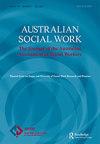Afghan Women’s Barriers to Seeking Help for Domestic Violence in Australia
IF 2
3区 社会学
Q2 SOCIAL WORK
引用次数: 4
Abstract
ABSTRACT Help seeking for domestic violence is complex and multifaceted, and settling in a new country might make the help-seeking process more challenging and complicated. This study explored the barriers to seeking help for domestic violence, specifically experienced by Afghan women after settling in Australia. The study involved 21 semistructured interviews with newly arrived Afghan women. Interviews were audio recorded and transcribed, and the data were analysed thematically. The barriers Afghan women experienced were embodied in cultural norms to stay in marital relationships, demands to preserve the family’s reputation, personal circumstances, and women’s experiences with, and perspectives on, available services. The findings suggest that policy and practice should recognise those barriers and respond to them in a culturally appropriate way. IMPLICATIONS Domestic violence services’ procedures and processes should be developed based on an understanding of multiple layers of oppression and barriers to seeking help for migrant women. Service providers should apply an intersectional lens along with antioppressive perspectives to address barriers to domestic violence services women experience at different levels. Social workers in domestic violence services need relevant training to provide culturally appropriate services to migrant women.阿富汗妇女在澳大利亚寻求家庭暴力帮助的障碍
家庭暴力求助是复杂而多方面的,在一个新的国家定居可能会使求助过程变得更具挑战性和复杂性。这项研究探讨了为家庭暴力寻求帮助的障碍,特别是阿富汗妇女在澳大利亚定居后所经历的障碍。这项研究对新来的阿富汗妇女进行了21次半结构化访谈。访谈被录音和转录,数据被按主题分析。阿富汗妇女遇到的障碍体现在保持婚姻关系的文化规范、维护家庭声誉的要求、个人情况以及妇女对现有服务的体验和看法。研究结果表明,政策和实践应该认识到这些障碍,并以文化上适当的方式应对这些障碍。家庭暴力服务的程序和流程应基于对移民妇女寻求帮助的多层压迫和障碍的理解。服务提供者应采用跨部门的视角和反压制的观点,解决妇女在不同层面经历的家庭暴力服务的障碍。家庭暴力服务的社会工作者需要接受相关培训,以便为移民妇女提供符合文化的服务。
本文章由计算机程序翻译,如有差异,请以英文原文为准。
求助全文
约1分钟内获得全文
求助全文
来源期刊

Australian Social Work
SOCIAL WORK-
CiteScore
4.20
自引率
16.70%
发文量
37
期刊介绍:
Australian Social Work is an international peer-reviewed journal reflecting current thinking and trends in Social Work. The Journal promotes the development of practice, policy and education, and publishes original research, theoretical papers and critical reviews that build on existing knowledge. The Journal also publishes reviews of relevant professional literature, commentary and analysis of social policies and encourages debate in the form of reader commentary on articles. Australian Social Work has grown out of the Australian context and continues to provide a vehicle for Australian and international authors. The Journal invites submission of papers from authors worldwide and all contributors are encouraged to present their work for an international readership.
 求助内容:
求助内容: 应助结果提醒方式:
应助结果提醒方式:


